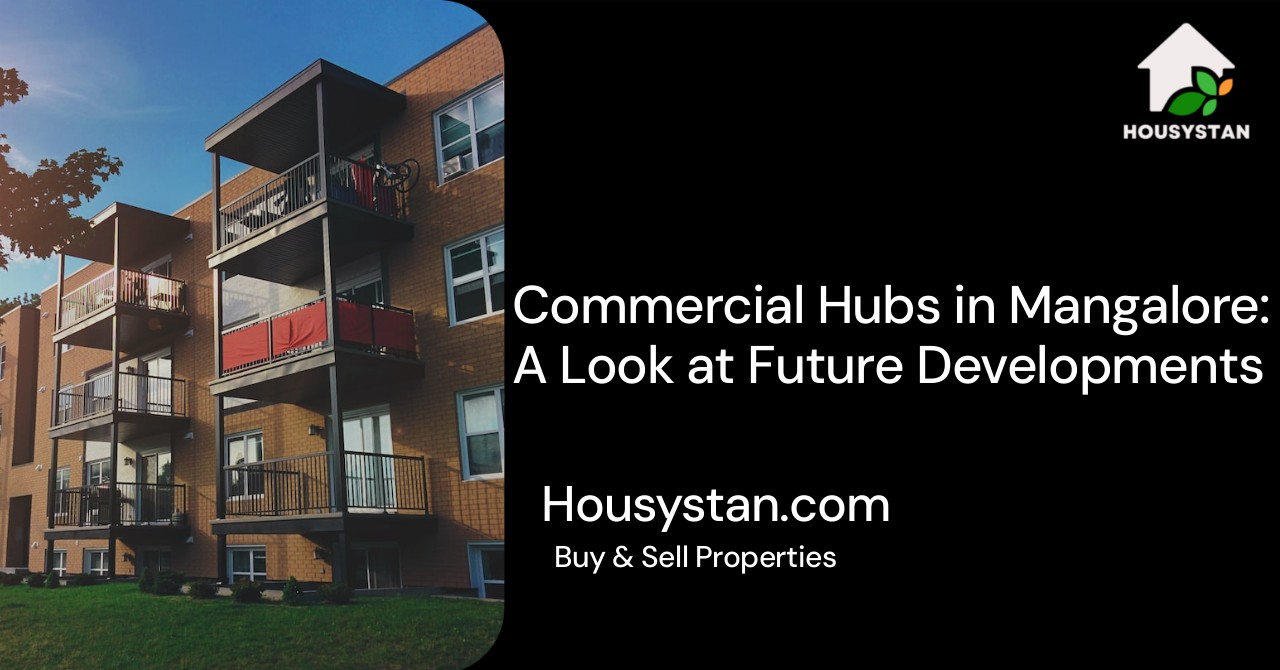Commercial Hubs in Mangalore: A Look at Future Developments
Read latest blogs and articles from Housystan

The Information mentioned here was last updated on:
21/2/2026Commercial Hubs in Mangalore: A Look at Future Developments
Introduction: Mangalore’s Evolving Urban Landscape
Mangalore, a bustling port city on India’s southwestern coast, is rapidly gaining prominence as a commercial powerhouse in Karnataka. With its rich history, strategic location, and thriving industries, Mangalore has become a magnet for investors, entrepreneurs, and businesses seeking new opportunities. As the city continues to expand, its commercial hubs are evolving to meet the demands of a modern economy and an upwardly mobile population. This article provides an in-depth look at the emerging commercial hubs in Mangalore, their future prospects, and the factors that are shaping the city’s economic landscape.
- Verified Tenants/Buyers
- Unlimited Property Listing
- Zero subscription/charges fee
The Rise of New Business Districts
Mangalore’s traditional business centers, such as Hampankatta and Balmatta, have long served as the city’s commercial heart. However, the last decade has witnessed the emergence of new business districts that are transforming the way commerce is conducted in the city. Areas like Kadri, Kankanady, and Bejai are experiencing a surge in commercial real estate development, with high-rise office complexes, retail malls, and hospitality ventures dotting the skyline. These new districts offer improved infrastructure, better connectivity, and modern amenities, attracting both multinational corporations and local enterprises.
Tech Parks and IT Corridors: The Digital Push
In recent years, the Karnataka government’s push to promote information technology has led to the development of IT parks and tech corridors in and around Mangalore. The establishment of the Mangalore SEZ (Special Economic Zone) and the proposed IT Park at Derebail have fueled job creation and positioned the city as an emerging tech destination. These hubs offer world-class facilities, uninterrupted power supply, and fast internet connectivity, providing an ideal environment for IT firms, startups, and business process outsourcing (BPO) companies. The influx of skilled professionals is not only boosting the local economy but also supporting ancillary businesses such as restaurants, co-working spaces, and retail outlets.
Retail Revolution: Shopping Malls and High Streets
The retail landscape in Mangalore is undergoing a significant transformation, with shopping malls and high streets rapidly replacing traditional marketplaces. Malls like Forum Fiza and City Centre have become popular destinations for shopping, dining, and entertainment, drawing crowds from across the city and neighboring regions. These commercial spaces offer a diverse mix of national and international brands, food courts, multiplexes, and event venues, making them attractive to both consumers and retailers. The rise of organized retail is also fostering a culture of leisure and lifestyle spending, further stimulating the city’s economic growth.
Hospitality and Tourism: An Emerging Commercial Sector
Mangalore’s picturesque coastline, historical monuments, and vibrant culture are attracting a growing number of domestic and international tourists. This has given rise to a robust hospitality sector, with new hotels, resorts, and serviced apartments springing up in commercial hubs. Areas close to the city’s beaches, such as Panambur and Surathkal, are witnessing the development of luxury properties catering to business and leisure travelers. The synergy between tourism and commerce is creating new avenues for investment and employment, enhancing Mangalore’s appeal as a holistic commercial destination.
Infrastructure Upgrades Fueling Commercial Growth
One of the key drivers behind the rise of commercial hubs in Mangalore is the city’s ongoing infrastructure upgrades. Major road projects, such as the widening of NH-66 and the development of the Mangalore Bypass, are improving connectivity between commercial centers, residential neighborhoods, and the port. The modernization of Mangalore International Airport and the expansion of the New Mangalore Port are further enhancing the city’s accessibility for business travelers and cargo movement. These infrastructure initiatives are making Mangalore an attractive location for industries such as logistics, warehousing, and manufacturing.
Real Estate Dynamics: New Opportunities for Investors
The boom in commercial development is creating lucrative opportunities for real estate investors and developers. Demand for office spaces, retail outlets, and industrial plots is on the rise, leading to competitive pricing and innovative project designs. Major national and local real estate players are launching mixed-use developments that integrate commercial, residential, and recreational spaces, catering to the diverse needs of businesses and residents. The city’s regulatory environment is also becoming more investor-friendly, with streamlined approval processes and incentives for projects that generate employment and support urban growth.
Sustainability and Smart City Initiatives
Mangalore’s transformation into a commercial powerhouse is being shaped by a growing emphasis on sustainability and smart urban planning. The city’s inclusion in the Smart Cities Mission has spurred investments in green infrastructure, waste management, and digital governance. Commercial developments are increasingly incorporating eco-friendly designs, energy-efficient systems, and green building certifications. The focus on sustainability not only appeals to environmentally conscious businesses and consumers but also positions Mangalore as a progressive city ready to meet future challenges.
Challenges and the Road Ahead
Despite the positive momentum, Mangalore’s commercial growth is not without challenges. Issues such as traffic congestion, land acquisition hurdles, and the need for skilled manpower must be addressed to sustain the city’s upward trajectory. Collaborative efforts by government agencies, private sector stakeholders, and community organizations are essential to create a balanced and inclusive growth model. Continued investment in education, healthcare, and public transport will ensure that the benefits of commercial development reach all sections of society.
Conclusion: A Promising Future for Mangalore’s Commercial Hubs
Mangalore stands on the cusp of a new era, with its commercial hubs leading the charge towards a vibrant, diversified economy. The city’s strategic location, proactive governance, and entrepreneurial spirit are attracting businesses from across the country and beyond. As infrastructure improves and new sectors emerge, Mangalore is poised to become one of India’s most dynamic commercial destinations. For investors, entrepreneurs, and professionals seeking growth and opportunity, the future of Mangalore’s commercial hubs promises innovation, prosperity, and a high quality of life.